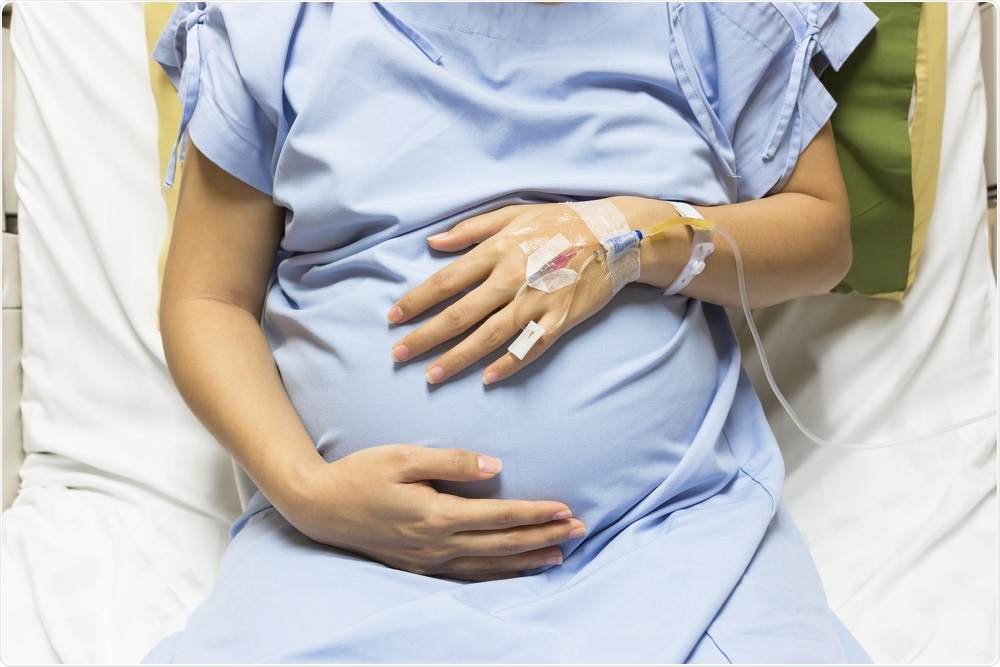
In a recent study, researchers from France evaluated the association between maternal morbidities and coronavirus disease 2019 (COVID-19). In this retrospective analysis, the researchers found that as compared to pregnant women without COVID-19, there was an increased frequency of pregnant women with maternal morbidities and the diagnosis of COVID-19.
This PLOS Medicine study is the first report on the obstetrical outcomes and maternal morbidities associated with COVID-19 in pregnant women.
 Study: Obstetrical outcomes and maternal morbidities associated with COVID-19 in pregnant women in France: A national retrospective cohort study. Image Credit: mikumistock / Shutterstock.com
Study: Obstetrical outcomes and maternal morbidities associated with COVID-19 in pregnant women in France: A national retrospective cohort study. Image Credit: mikumistock / Shutterstock.com
Introduction
In early 2020, the impact of infection with the severe acute respiratory syndrome coronavirus 2 (SARS-CoV-2), which is the virus responsible for COVID-19, on pregnant women was unknown. While the common symptoms of this disease included mild pneumonia, severe COVID-19 was associated with an increased likelihood of hospitalization, admission to intensive care unit (ICU), or even death.
Previous reports have suggested that SARS-CoV-2 infection increased the risk of maternal and neonatal morbidities. These studies have also shown a higher risk of hospitalizations and adverse outcomes in SARS-CoV-2 infected pregnant women.
Despite these observations, the risk for maternal morbidities and adverse obstetric outcomes in pregnant women with COVID-19 needs to be fully evaluated. Is there an association between the two?
To answer this question, the researchers behind the current study aimed to determine whether maternal morbidities and adverse obstetrical outcomes were more frequent in pregnant women with COVID-19 as compared to pregnant women without COVID-19. The findings from this study will help in the treatment policies and the management of pregnancies during the COVID-19 pandemic.
Study findings
The researchers collected data from the French national hospitalization database (PMSI), taking a national cohort of all hospitalized pregnant women for births after 22 weeks of gestation in France from January to June 2020. They analyzed 244,645 births during this period, of which 874 women were diagnosed with COVID-19.
The researchers reported that the pregnant women with COVID-19 were identified from the database if recorded with the International Classification of Disease (ICD-10) code for the presence of hospitalization for COVID-19. To confirm hospitalization for COVID-19 in the women, the researchers included having symptoms of COVID-19 associated with signs of COVID-19 on computed tomography (CT) chest scans, a positive reverse-transcriptase polymerase chain reaction (RT-PCR) and/or antigen test, and/or serology test positive for COVID-19. Both symptomatic and asymptomatic patients were included in this study.
The researchers presented all the characteristics of the women with and without COVID-19 diagnosis, including the obstetrical complications according to the presence or absence of COVID-19 diagnosis. The model used in this study adjusted on patient characteristics including maternal age, body mass index, active smoking, parity, history of diabetes or hypertension, multiple pregnancies, and assisted reproductive technique (ART) conception.
Study findings
As compared to pregnant women without COVID-19, those with COVID-19 were older, more likely to be obese, had multiple pregnancies, and had a history of hypertension. The researchers observed that the frequency of assisted reproductive technique (ART) conception was not different between those with and without a COVID-19 diagnosis.
As compared to the non-COVID group, pregnant women with COVID-19 had an increased likelihood of being admitted to the intensive care unit (ICU), mortality, preeclampsia/eclampsia, gestational hypertension, postpartum hemorrhage, preterm birth at less than 37 weeks, 32 weeks, and 28 weeks of gestation, induced preterm birth, spontaneous preterm birth, fetal distress, and cesarean section.
Consistent with previous studies, the frequency and severity of preterm births, both spontaneous and medically induced, were more likely to occur in pregnant women with COVID-19. Notably, fetal distress was also more in the COVID-19 cases.
Other complications such as pregnancy terminations after 22 weeks of gestation, stillbirths, gestational diabetes, placenta praevia, placenta abruption, and venous thromboembolic events were similar between the COVID-19 and non-COVID-19 groups.
Conclusion
In comparing two groups of pregnant women with or without COVID-19 during the first wave of the COVID-19 pandemic, the current study aimed to address whether COVID-19 is associated with an increased risk of adverse obstetrical outcomes among pregnant women.
This study presented a retrospective observation of an increased frequency of pregnant women with maternal morbidities and diagnosis of COVID-19 as compared to pregnant women without COVID-19. These results indicate that pregnant women with COVID-19 present an increased risk for obstetrical morbidities.
Notably, in populations with a known risk of developing a severe infection or obstetrical morbidities, it is essential to be informed of the possibilities that are involved. This may ensure that obstetrical units better inform pregnant women and provide the best care under such scenarios.
Based on the results from this study, the researchers reaffirmed recent recommendations of vaccination for pregnant women.